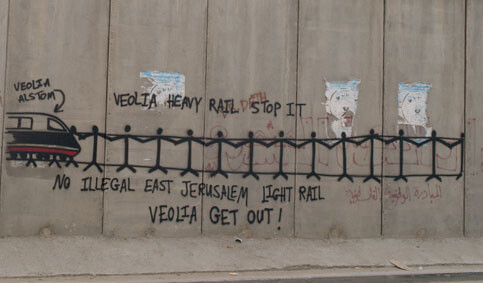The Electronic Intifada 5 June 2008

(Image courtesy of Adri Nieuwhof)
Last week, the managing director of SNS Asset Management, a division of the Dutch SNS Bank, sent me a letter explaining the bank’s position on divesting from Veolia. Veiola is a European company contracted to build a tramway on illegally seized Palestinian land that connects Israeli settlements on the West Bank, constructed in open violation of international law, with neighborhoods in West Jerusalem. Over the past two years, SNS Bank, ranked in the top-five of Dutch banks, received many letters from Israeli, Palestinian and Dutch organizations and international law experts calling for divestment from Veolia, because of the company’s involvement in the tramway project.
In its letter, SNS Bank stated that “the Israeli occupation of Palestinian territory is not consistent with international law. However, the bank does not consider the construction of the tramway as a direct, grave violation of human rights. Therefore excluding Veolia is considered disproportionate. Nevertheless, we see the activities as unwanted within the framework of a responsible peace process, and we will call upon Veolia not to engage with similar future projects. Noting the relative small interest of these activities for Veolia, such a request is not without a chance.”
The Bank added that it may still decide to divest in such a “trajectory of engagement,” in case Veolia does not produce a satisfactory response. However, Veolia has a bad track record in responding to these kinds of requests. In 2006, Veolia replied to my questions about its involvement in the tramway project with a letter. When ASN Bank started an engagement trajectory with Veolia to assess whether it was involved in the tramway project, Veolia refused to take the ASN Bank’s concerns seriously. This led to a decision by ASN Bank, a subsidiary of SNS Bank to divest itself of its holdings in Veolia. Based on its past actions, it is unlikely that Veolia will respond in a serious way to SNS’s request, and the onus will be on the bank to respond as its subsidiary did.
Meanwhile, legal action in France against Veolia and Alstom by Association Solidarite France Palestine and the Palestinian Liberation Organization has been painful for the companies. They were ordered to submit their contract with the Jerusalem Municipality, which demonstrated that the court in Nanterre did not trust Veolia when it claimed it did had not signed a contract. Another financial institution, the Swiss Sarasin Bank, which is owned by Dutch Rabo Bank, also invests in Veolia through three investment funds that Sarasin claims to be “sustainable.” Mr Andreas Holzer, Assistant Vice-President Sustainable Research, explained to me that he is aware “that the issue is controversial” and is following the court case in Nanterre closely.
While, it is encouraging to know that Sarasin follows the Nanterre court case closely and that SNS Bank is approaching Veolia with the message that its Israeli activities are unlawful and it should not expand these activities. However, SNS Bank has not asked Veolia to publicly explain its current activities, which violate international law. Apparently, that would be unacceptable. According to SNS Bank, a “small” violation of the law is no ground for exclusion of Veolia. It forgets that this “small” violation of international law threatens the Palestinians recognized right to self-determination, results in destruction of Palestinian property and supports illegally-constructed settlements. Investment funds involved in projects violating international law are both immoral and unsustainable. Thus, by selling investment funds as “sustainable” and continuing to invest in Veolia, SNS Bank makes false claims to their customers.
Adri Nieuwhof is a consultant and human rights advocate.





